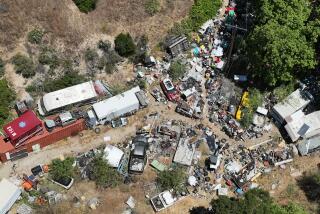Video Piracy Suspects Arrested in Area Raids : Movies: Surveillance by the Motion Picture Assn. led police to a Sun Valley home where they found taping in progress.
- Share via
The film “What’s Eating Gilbert Grape” was being copied at the very moment police raided the house in Sun Valley, seizing more than 4,000 videotaped movies, 2,000 blank tapes, 21 videocassette recorders, 1,500 blank video sleeves and other alleged evidence of a major “pirate lab.”
What’s eating the Motion Picture Assn. of America is that the three-bedroom suburban home appears to be part of a video black market that costs the movie industry millions of dollars a year, MPAA officials and police said Friday.
Three people were taken into custody Wednesday at the Sun Valley house in the 8400 block of Canterbury Avenue, and two others were arrested in a separate raid earlier this week in Carson by police, sheriff’s deputies and the MPAA’s so-called “flick dicks.”
In Sun Valley, Los Angeles police arrested Virgilio Chua, 36, his wife Elizabeth Rodriguez, 37, and their aunt, Beatriz Rodriguez Palayan, 44, at the couple’s Canterbury Avenue home. They were charged with felony bootlegging of videotapes, distributing them to dealers and selling them in two of their own stores in downtown Los Angeles--Twin A Video and RPJ Video, also known as JJ Video, said Los Angeles Police Sgt. Ken Johnson of the Foothill Division.
All three posted $2,500 bonds and were released from the Van Nuys Jail, Johnson said. None could be reached for comment. Copying 100 or more videotapes without permission is a felony crime.
The case began when MPAA investigators noticed Chua coming and going from several suspect locations they had under surveillance, said an association spokeswoman, Marisa Pickar. They began following Chua and collecting information, then went to the police to help them obtain a search warrant, she said.
When police arrived at the house about 7:45 a.m., they found 10 recording VCRs hooked up to an 11th machine playing a movie, said Officer Andy Markel, a Valley vice investigator. “He had three more set up in another closet and six in a garage,” Markel said.
Police are still investigating a fourth person, Markel and Johnson said.
In Carson, sheriff’s deputies took into custody a video store owner and his wife who have had previous run-ins with the MPAA, according to Pickar. Hea Soo Kim, 46, was still being held in the Los Angeles County Central Jail on Friday on suspicion of bootlegging videotapes and selling or renting them from his Carson store, Kim’s California Video.
Deputies seized more than 1,200 allegedly unauthorized videocassettes from the store, where they also found five duplicating machines, according to an MPAA announcement.
Kim’s wife, 29-year-old Soo Kim, was released without charge on Tuesday. Neither could be reached for comment.
Pickar said the MPAA had won a $100,000 judgment against the couple in 1992 in a civil case, and had seized 13 VCRs and 300 pirated videos in another civil complaint in 1986.
Legally distributed videotapes sell for an average of $55 each, while bootlegged versions go for as little as $10 on the street, Pickar said.
Illegal videos not only rob the film industry of an estimated $2 billion a year internationally, but cheat legitimate vendors out of business and consumers out of quality, said Anthony J. Adamski, the MPAA’s anti-piracy director.
New movies that have yet to be released on videotape often are clandestinely videotaped in theaters, Adamski said--and a big source of tips to the MPAA’s anti-piracy hot line are angry consumers.
“Picture yourself watching your VCR and all of a sudden you see a head pop up from the left side and all of a sudden the screen goes dark because someone has left to get popcorn. Or you can hear the voices of people,” Adamski said.
He said authorities believe there are 15 to 30 major pirating labs operating in the Los Angeles area.
More to Read
Sign up for Essential California
The most important California stories and recommendations in your inbox every morning.
You may occasionally receive promotional content from the Los Angeles Times.










